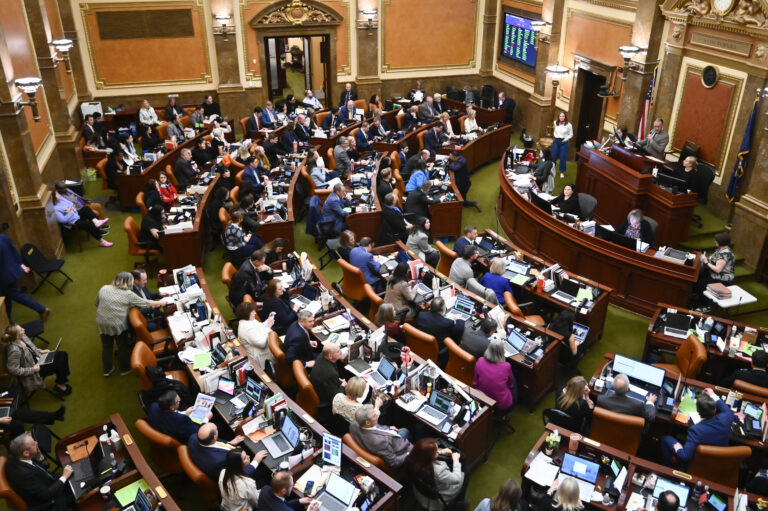As in statehouses across the country, Utah saw headline-gripping issues and national debate woven into bills that made their way through the Legislature with different measures of success.
The reality that “all politics is national” is something Utah Gov. Spencer Cox said he and lawmakers can’t escape — even though he told Utah News Dispatch in an interview Friday that he wished that wasn’t the case.
“I think it’s very unhealthy for us that all politics is national, but whether I like it or not, it’s true. It just happens,” he said. “I like when we’re focusing more on local issues … but I don’t get to make all the decisions. So if there are issues we should fix them, and we’ve done a good job of that. And if there aren’t, we should let somebody else work on it.”
From immigration bills designed to bolster President Donald Trump’s promises for mass deportations, to a fourth year of restrictions on transgender Utahns, to the possibility of Utah becoming the first state in the nation to outlaw fluoride in drinking water systems, these are some of the hot-button bills of the 2025 legislative session.
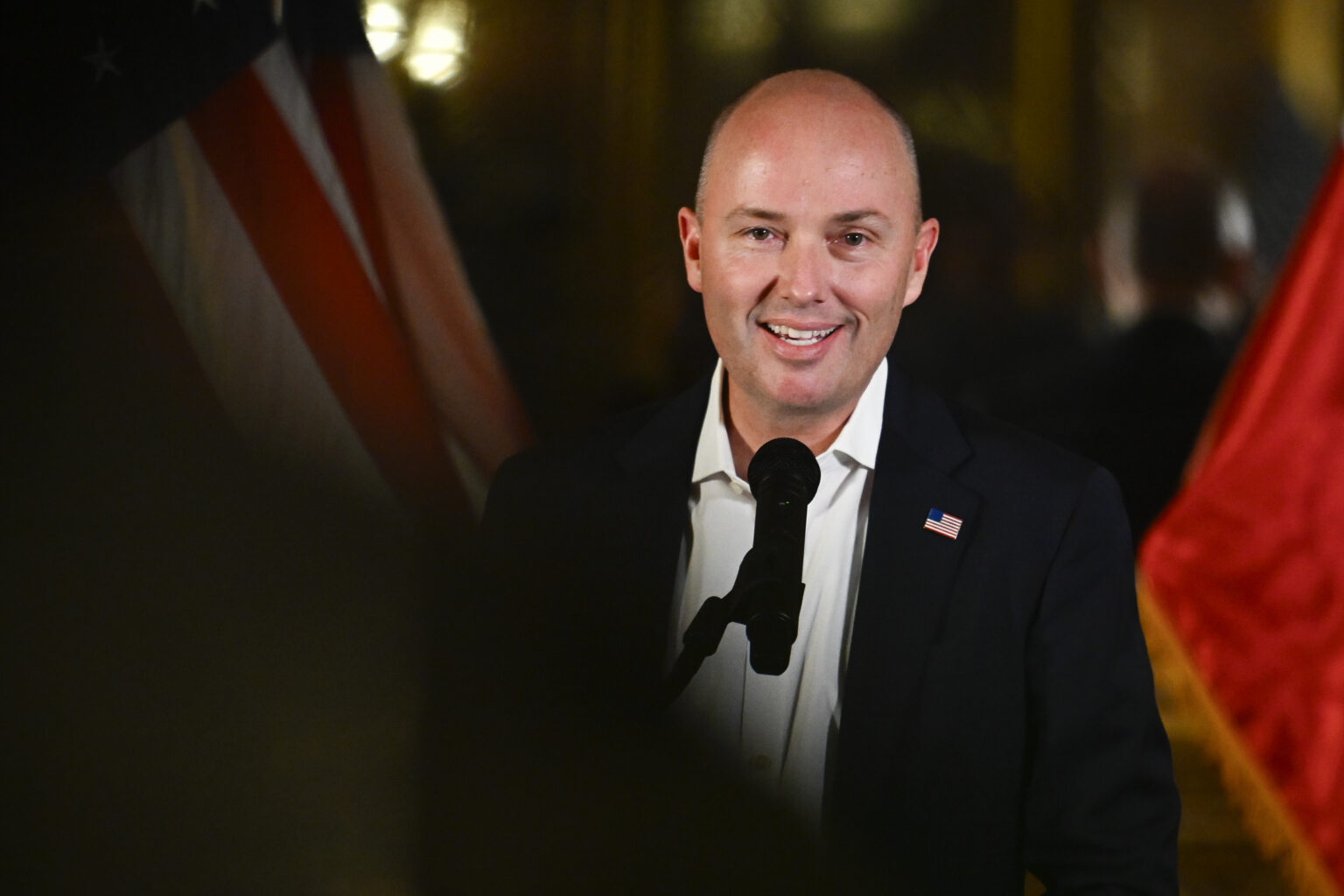 Gov. Spencer Cox speaks to reporters during the last night of the legislative session at the Utah State Capitol, Friday, March 7, 2025. (Photo by Alex Goodlett for Utah News Dispatch)
Gov. Spencer Cox speaks to reporters during the last night of the legislative session at the Utah State Capitol, Friday, March 7, 2025. (Photo by Alex Goodlett for Utah News Dispatch)
Boost to deportations passes while other immigration bills stall
With the Trump administration vowing to carry out mass deportations, lawmakers looked for ways to help the federal government achieve its immigration goals this session.
Among them is a law passed on Friday that requires a judge to impose a mandatory jail or prison sentence for crimes committed by an immigrant who has already been deported, then charged with felony reentry to the U.S; and a bill that would increase the maximum sentence for class A misdemeanors to one year.
Per federal law, if an immigrant, regardless of their legal status, serves at least 365 days in jail or prison, deportation proceedings are automatically initiated upon their release. Lawmakers say the bill, which only applies to violent misdemeanors, will lead to more deportations.
But critics worry that since the federal government is already deporting immigrants, whether they’ve committed crimes or not, the bill will disproportionately impact those living in the country legally.
And despite a focus on immigration policies this year, several bills that were touted leading up to the session ultimately died. That includes:
- An attempt to require Utah companies with more than 15 employees to verify their employees’ immigration status through the E-Verify system (current Utah law puts that threshold at 150).
- A proposed tax on wire transfers to foreign countries if the sender does not have a valid state ID or visa.
- And a bill allowing law enforcement to impound a vehicle if the driver does not have a license, a response to what lawmakers said is an increase in migrants who lack legal status on Utah roads.
Another year targeting trans Utahns, pride flags
For the fourth year in a row, Republican lawmakers passed legislation targeting the LGBTQ+ community. One new law will require transgender students at public universities to live in dorms corresponding with their sex at birth and orders the Utah Board of Higher Education to create a compliance plan for universities to follow.
HB269, which has been signed by Cox, followed an incident at Utah State University where a mother of a student complained to the school because her daughter was sharing a common space with a transgender resident assistant, who had been randomly assigned to live in the dorm.
The bill elicited intense emotions among the queer community, who said during public comment and protests they felt discriminated against.
“The LGBTQ community is so tired,” said Rep. Sahara Hayes, D-Millcreek, the Legislature’s only openly gay member, during a House floor debate. “We are so tired of being scared every year when this body meets because we don’t know how we’re going to be targeted. We don’t know how our loved ones and our families are going to be targeted, but it’s starting to feel inevitable that it will happen.”
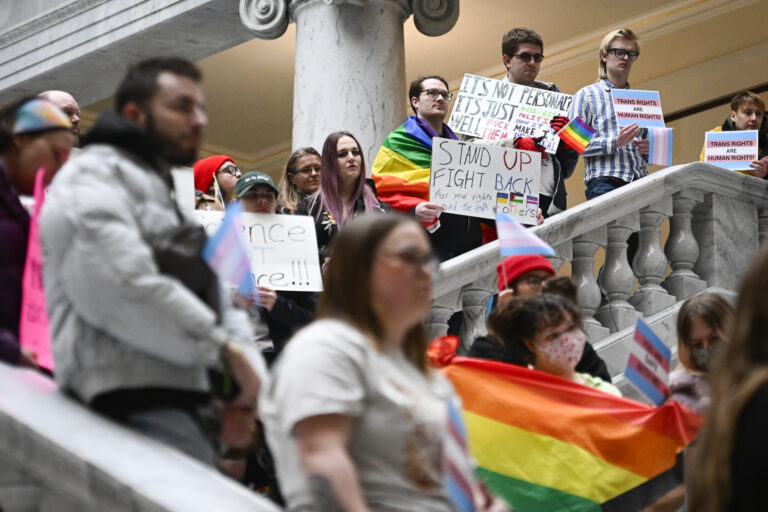 A crowd gathers during a LBGTQ+ rights protest at the Utah State Capitol on the last day of the legislative session, Friday, March 7, 2025. (Photo by Alex Goodlett for Utah News Dispatch)
A crowd gathers during a LBGTQ+ rights protest at the Utah State Capitol on the last day of the legislative session, Friday, March 7, 2025. (Photo by Alex Goodlett for Utah News Dispatch)
Another bill, HB77, bans pride flags from being displayed in classrooms and all government-owned property. Rep. Trevor Lee, R-Layton, repeatedly told lawmakers throughout the bill’s journey that the legislation was aimed at ensuring “political neutrality,” but critics of the bill blasted Lee for taking away certain freedoms of expression.
“It’s important that our communities and our teachers are able to focus their skills on where it matters. Whether it’s their community or their classroom, our state government should not have the ability to violate these freedoms of speech,” Anna McNamer, a middle school teacher, told lawmakers during a committee hearing on the bill. “Our government should not be able to give us a list of appropriate or correct flags to display at any time in a secular education setting.”
Other bills like HB521, which would have banned public funding for transgender medical procedures and likely would have impacted University of Utah Health’s Transgender Health Program, stalled during the session.
Through it all, several protests and demonstrations took place to show solidarity and support for the LGBTQ+ community during the 45-day session.
As part of a growing national trend cracking down on transgender inmates, lawmakers passed a bill this year that prevents the state’s county jails and two prisons from administering “cross-sex hormone treatment” and any kind of gender-affirming surgeries for adult inmates. People who started treatment before incarceration would be allowed to continue it.
According to the Utah Department of Health and Human Services, which oversees health care in the state’s two prisons, there are currently 33 Utah inmates receiving hormone replacement therapy — 29 transitioned from male to female, and the remaining four transitioned from female to male. The Department of Corrections houses approximately 6,300 incarcerated individuals, according to its website.
Inmates at the state’s prisons are already not allowed to undergo cosmetic or elective surgeries.
The bill, HB252, would also require all minors in a detention center to be housed in accordance to their sex assigned at birth, while prohibiting the use of puberty blockers. It also prevents sexual relations between staff and people housed in juvenile detention centers (people up to 25 years old are sometimes housed in these centers).
Utah takes on ‘MAHA’
Another nationally charged issue that crept into this year’s session was the “Make America Healthy Again” movement, popularized by U.S. Health and Human Services Secretary Robert F. Kennedy Jr.
A bill by Rep. Kristen Chevrier, R-Highland, would direct Utah’s Department of Workforce Services to request a waiver from the federal government in order to prohibit the purchase of soda with the use of Supplemental Nutrition Assistance Program benefits. An early version of the bill also would have blocked candy purchases.
More than once, Chevrier told her colleagues that the bill was one way lawmakers could “facilitate DOGE efforts.”
“This is a common-sense proposal, one that is being considered by at least a dozen other states this year, and one that will be well received by the Trump administration, but also by anyone who’s concerned about the overall health of our nation,” she said during a House floor debate.
HB403 passed the House and Senate and is awaiting the governor’s signature.
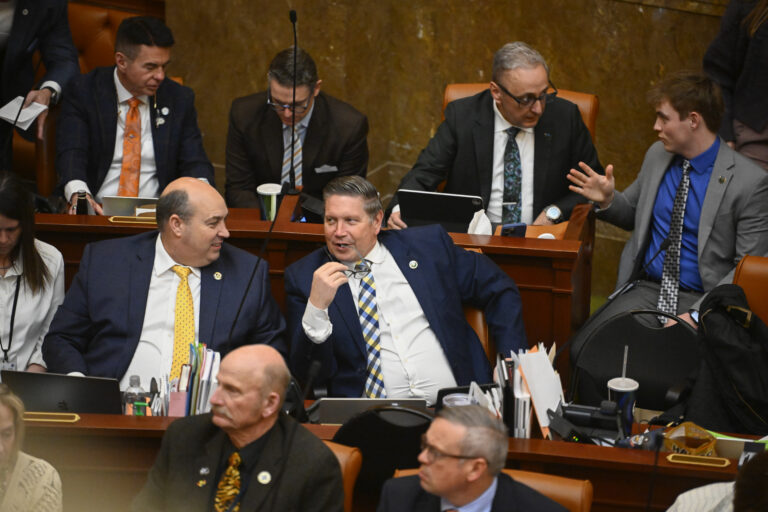 Rep. Walt Brooks speaks with Rep. Val Peterson on the last day of the legislative session at the Utah State Capitol, Friday, March 7, 2025. (Photo by Alex Goodlett for Utah News Dispatch)
Rep. Walt Brooks speaks with Rep. Val Peterson on the last day of the legislative session at the Utah State Capitol, Friday, March 7, 2025. (Photo by Alex Goodlett for Utah News Dispatch)
No more added fluoride to drinking water
Lawmakers also approved a ban on a practice that has been more aggressively targeted in conservative circles — adding some extra fluoride to public water systems.
There were lengthy debates with the public split over freedom of choice and whether the health implications of adding fluoride to water were positive or negative. Ultimately, the ban prevailed.
HB81, which would prohibit adding fluoride to public water systems, passed this session and is only waiting for the governor’s signature, which could make Utah the first state in the nation with a blanket fluoride ban. The final vote blurred party lines.
Fluoride can occur naturally in water, but U.S. municipalities have added extra for decades because of its ability to fight tooth decay. However, opposition to fluoride has been a trend around the country, particularly amid growing skepticism toward science and public health measures in the wake of the COVID-19 pandemic.
Dentists, especially in vulnerable communities, say they have seen dramatic decreases in decay, but critics have long questioned whether the substance is safe, even in the relatively low levels water systems use.
Rep. Stephanie Gricius, R-Eagle Mountain, the bill sponsor, cited a court decision ruling the Environmental Protection Agency should take action to address potential health risks associated with high levels of the mineral in drinking water. The court didn’t require a specific action, though. It just asked the agency not to ignore the issue.
However, the bill wouldn’t necessarily prevent Utahns from getting access to fluoride if they choose so, since the legislation would also allow pharmacists to prescribe it for easier access.
Planned Parenthood courses blocked from schools
While Utah saw fewer bills this year related to abortion care and access as the state’s near-total ban continues to be held up in court, one bill rose up targeting Planned Parenthood’s education courses.
With HB233, Rep. Nicholeen Peck, R-Tooele, wanted to ban Planned Parenthood educators from public schools. She successfully pushed it all the way through the House and Senate, arguing “elective abortion providers” shouldn’t be teaching in schools.
Along mostly party-line votes, both the House and Senate gave final legislative approval to that bill Friday night. It now goes to the governor for consideration.
In response Kathryn Boyd, president & CEO of Planned Parenthood Association of Utah, issued a statement expressing disappointment but adding the organization’s sexual health education resources aren’t going anywhere.
“Planned Parenthood Association of Utah educators have provided medically accurate, age-appropriate health education for more than 50 years, and we won’t stop now,” she said. “Even if we can no longer teach in public schools, we will still be here for our community, offering expert health education to those who need it.”
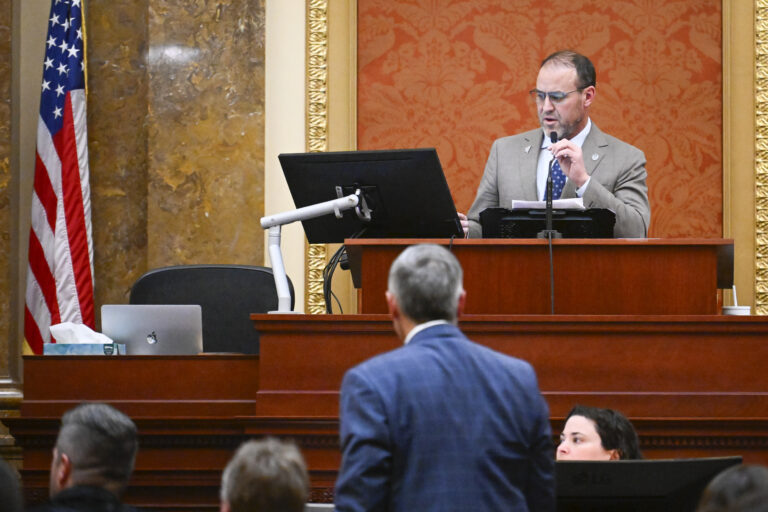 House Speaker Mike Schultz, R-Hooper, works on the last day of the legislative session at the Utah State Capitol, Friday, March 7, 2025. (Photo by Alex Goodlett for Utah News Dispatch)
House Speaker Mike Schultz, R-Hooper, works on the last day of the legislative session at the Utah State Capitol, Friday, March 7, 2025. (Photo by Alex Goodlett for Utah News Dispatch)
A year of crime and public safety bills
Amid heightened nationwide conversations about crime and public safety, a number of bills — both successful and unsuccessful — sought to increase penalties, create new offenses, crack down on espionage, and create new guidelines for law enforcement and first responders.
- HB87 creates a new criminal penalty for trafficking fentanyl, or a fentanyl-related substance. The law makes it a first-degree felony for anyone caught with more than 100 grams of the synthetic opioid.
- SB180 directs law enforcement officers to disclose when they use artificial intelligence, while requiring departments around the state to create an approved policy concerning artificial intelligence use.
- Inspired in part by Ruby Franke and the infamous case of child abuse, SB24 creates a new crime in Utah statute called child torture. Now, child abuse that is “exceptionally cruel or exceptionally depraved” would be prosecuted as child torture, and require mandatory prison time.
- HB430 is aimed at curbing espionage on Utah military installations, designating bases as off-limits for food delivery services. Lawmakers say foreign nationals, posing as food delivery drivers, have been trying to access military bases around the country to conduct surveillance.
- HB405 created new mandatory minimum sentences for human trafficking, a first-degree felony. Now, anyone guilty of the crime will face a minimum of 10 years in prison; if the victim is younger than 14 years old, the minimum sentence would be 15 years.
- HB65 expands the list of cancers tied to service as a firefighter and makes cancer screenings more available for firefighters.
As the session progressed this year, it was clear the House and Senate had their differences. A number of crime and public safety-related House bills ultimately failed in the Senate, and vice versa. That includes:
- HB143 would have established a week in February where Utahns could buy firearm safety equipment, like a gun safe or trigger lock, without having to pay sales tax.
- HB133 would have made a number of incremental changes to the state’s gun laws. But controversy over allowing 18-year-olds to open carry a loaded firearm ultimately sank the bill in the Senate.
- HB132 was intended to curb unintentional shootings, creating a misdemeanor offense for adults who fail to secure their firearms if their children then go on to use the firearm in a crime.
- The Utah Domestic Violence Coalition lobbied for $1.4 million in annual funds for various domestic violence shelters and service providers, and an additional $260,000 to help law enforcement conduct exams for victims in strangulation cases.
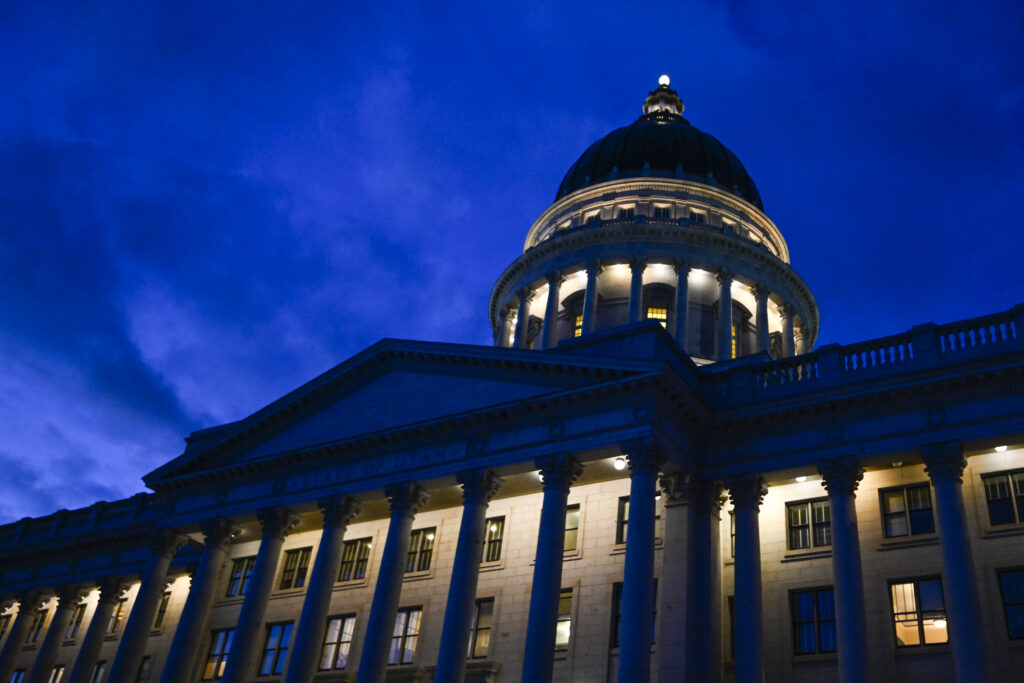 The Capitol in Salt Lake City is pictured at dusk on the last night of the legislative session, Friday, March 7, 2025. (Photo by Alex Goodlett for Utah News Dispatch)
The Capitol in Salt Lake City is pictured at dusk on the last night of the legislative session, Friday, March 7, 2025. (Photo by Alex Goodlett for Utah News Dispatch)


